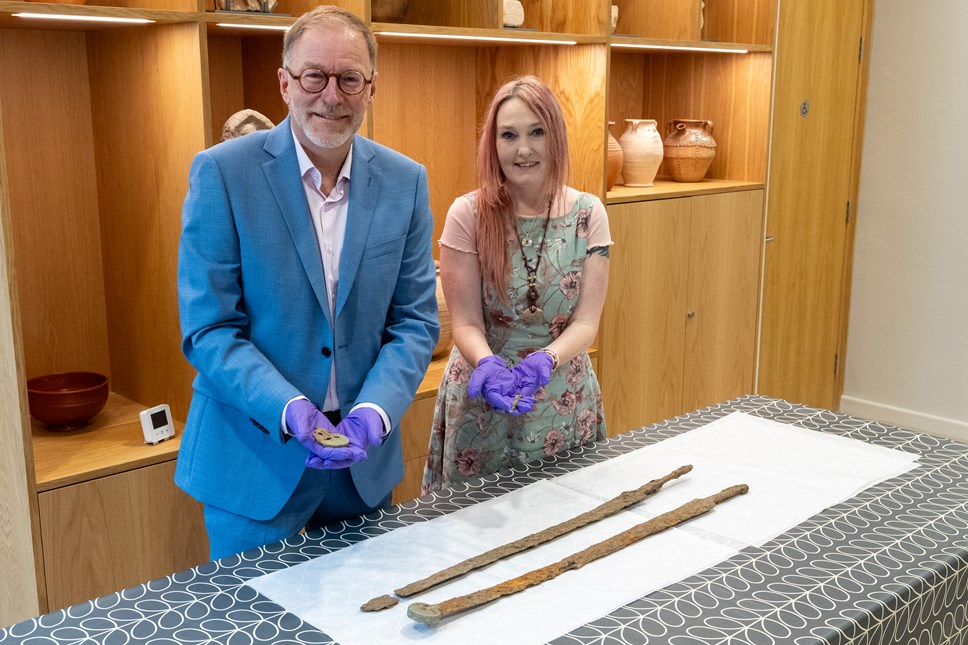
Ancient Roman Swords Unearthed in the Cotswolds “A Remarkable Archaeological Find”
A rare and important find has been unearthed in the Cotswold District. Two Roman cavalry swords along with remnants of their wooden scabbards and fitments were discovered by Glenn Manning during a metal detectorist rally in the north of the Cotswolds. There was also a broken copper alloy bowl discovered with the weaponry.
Cllr Paul Hodgkinson, said: “This new discovery shows what an incredibly deep history the Cotswolds has. People famously asked, ‘What have the Romans ever done for us?’. Well, they have just given us some amazing examples of weapons used almost 2000 years ago when Cirencester was the second biggest town in Britain. This is truly a remarkable archaeological find and I can’t wait for visitors to see them on display in the years to come.”
The swords were appraised by Professor Simon James from Leicester University who says that these weapons are middle imperial Roman swords commonly referred to as a spatha. They were in use in the Roman world probably by the 160s, through the later second century and far into the third century AD.
Their considerable length suggests that they are cavalry weapons-- or, more accurately, weapons intended for use on horseback. It was not illegal for civilians to own such weapons and to carry them for travelling because Roman provinces were plagued with banditry.
Prof. James, explained: “In terms of parallels, I can’t think of finds of more than one sword being deposited in any similar circumstance from Roman Britain. The closest that springs to mind was a pair of similar swords found in Canterbury—with their owners, face down in a pit within the city walls, clearly a clandestine burial, almost certainly a double murder.”
Soon after the discovery, Kurt Adams, Finds Liaison Officer, deposited the finds with the Corinium Museum to ensure their preservation.
Historic England is assisting the museum by arranging for the swords to go for further analysis under x-ray. Archaeological appraisal at the dig site in the north of the Cotswolds may follow to help put the swords into context, as we don’t know why they ended up buried in the Cotswolds.
To learn more about the history of the Cotswolds and to visit the Corinium Museum, visit: coriniummuseum.org
Contact Information
Cotswold District Council Communications Team
Notes to editors
About the Corinium Museum
The Corinium Museum is an award-winning museum at the heart of Cirencester, the ‘Capital of the Cotswolds’. The principal collection consists of highly significant finds from the Roman town of Corinium. However, the museum today is much more than that, taking you on a journey through time and charting the development of the Cotswolds from its prehistoric landscape to the modern day. Freedom Leisure runs this facility on behalf of Cotswold District Council.
About Historic England
Historic England is the public body that helps people care for, enjoy and celebrate England's spectacular historic environment. They protect, champion and save the places that define who we are and where we've come from as a nation. Historic England care passionately about the stories they tell, the ideas they represent and the people who live, work and play among them.
Photo:
Cllr Paul Hodgkinson, Cotswold District Council Cabinet Member for Leisure, Culture and Health and Emma Stuart, Corinium Museum Director.
Video:
Cllr Paul Hodgkinson and Emma Stuart talking about the significance of the finds. You can download and use this video on your own channels here: Roman Swords Video Content.
Media contacts:
Sarah Lewis, Commercial Services and Marketing Manager [email protected]
Emma Stuart, Museum Director - [email protected]
